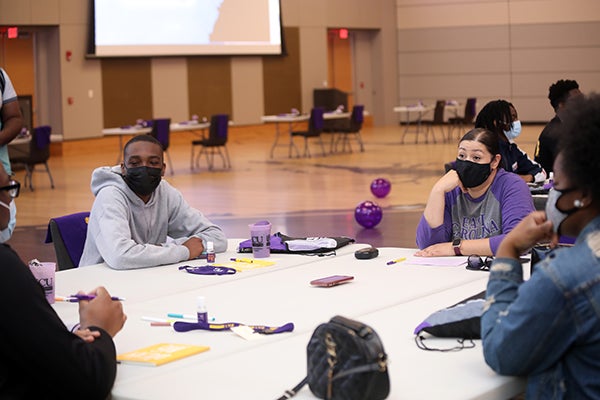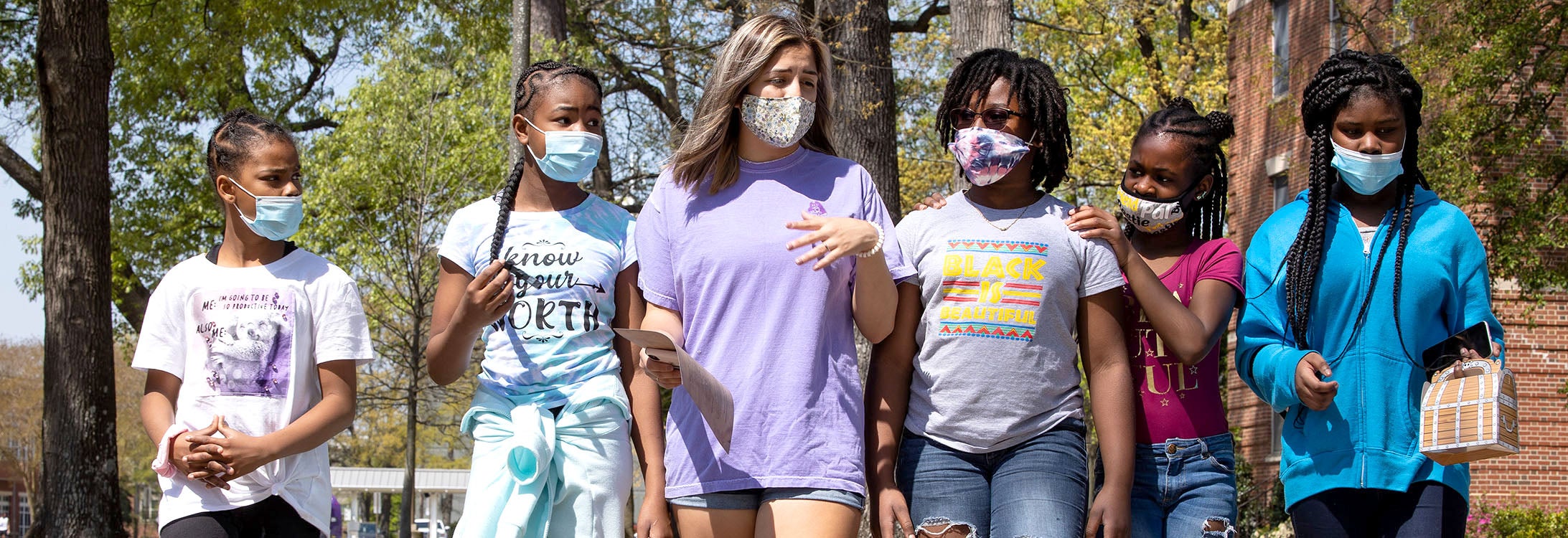DREAM BIG
ECU introduces K-12 students to benefits of college education
Many students at East Carolina University say that visiting campus solidified their decision to become a Pirate. Officials are working to introduce more students, at younger ages, to life as an ECU student.
“We feel like, in undergraduate admissions, that it’s really important for ECU to connect with younger students in elementary school and in middle school, so that they get to know us from an early age and so that maybe we can create some sort of affinity to ECU,” said Stephanie Whaley, assistant vice chancellor and director of ECU undergraduate admissions.
The Office of Undergraduate Admissions has taken several steps to create ways for elementary and middle school students to connect with ECU, including the creation of a video that asks them what they want to be when they grow up and stickers of PeeDee for students. When COVID restrictions are eased and it’s safe to do so, campus tours geared toward younger students will begin again.

Dr. Bethany McKissick listens to students in her focus group discuss what they think about college during the Dream Big event. (Photo by Kristen Martin)
“We want as many young people on our campus as possible,” Whaley said. “We want them to see what a college campus looks like. Sometimes, especially our students from eastern North Carolina, they may have never been on a college campus and if they start to actually walk our sidewalks and eat in our dining hall, they can start to imagine themselves there someday.”
Whaley is not alone in her efforts to make college accessible for rural students. Dr. Crystal Chambers in the College of Education’s Department of Educational Leadership is studying the college choices of rural students through a Carnegie Foundation grant.
“Growing up in suburbia and being bused into the inner city for schooling, I developed friendships with individuals who for reasons beyond ability did not attend college,” she said. “As I reflected more generally on my summertime experiences with my family and friends in rural Virginia, I realized that many of the people from that space did not attend college either — even individuals I would have presumed as just like me. Focusing on rural education brings to light discourses within rural communities, specifically the messaging about college and who can or should go.”
As part of her grant, Chambers organized an event on ECU’s campus called “Dream Big: A Day in the Life of” to bring to campus K-12 students from surrounding counties who may not be on a college track. The April 6 event brought together students from Bethel’s Center for Science, Technology, and Leadership and Rocky Mount’s WTC Next Generation Ministries.
“I am very pleased that our partners were able to share this opportunity with the students they serve during their spring break,” Chambers said. “Just scanning the ‘dream passes’ in which students shared with us what they would remember about the day, they said, ‘the fun we had,’ ‘the people’ and ‘to believe in myself and never give up.’”
After being picked up by an ECU Transit bus, students heard from Whaley, Chambers and other faculty, staff and students. They also had the opportunity to participate in a scavenger hunt around the campus to learn more about ECU.
“The key takeaway I hope students remember is that college gives opportunities,” Chambers said. “Moreover, I think the conversation about who is ‘college material’ needs to change.”
Students had the chance to discuss their future and college choice in small focus groups with College of Education faculty. These discussions positioned college as a possibility for everyone.
“By reorienting college conversations from ‘if you are going to college,’ where some students are left out of the conversation, toward ‘what college are you going to after high school,’ students gain an inspirational point of leverage,” Chamber said. “They gain the belief that someone else believes in their abilities which can, in turn inspire the self-confidence to dream big and pursue those big dreams.”
That is exactly what the Office of Undergraduate Admissions is hoping to accomplish: enabling all students to imagine themselves as a college student.
“In rural counties, there are careers that you don’t see in your communities on a regular basis, and we want to expose rural students to them,” Whaley said. “What I hope with these elementary students is we can start in phase one with the fun stuff, like connecting them to PeeDee, but eventually in middle school, we start talking more about careers and the pathway to certain careers and the preparatory information for what they need to do in high school.”
One of the goals for undergraduate admissions is to receive funding to help local school systems bring K-12 students to campus.
“One of the challenges is that a lot of schools don’t have the extra funding to fund the bus, the bus driver, the gas and all of those things,” Whaley said. “What we have to be able to do for those rural communities that have a lot of potential first-generation college students is to make cost not a barrier for them to have these experiences.”
